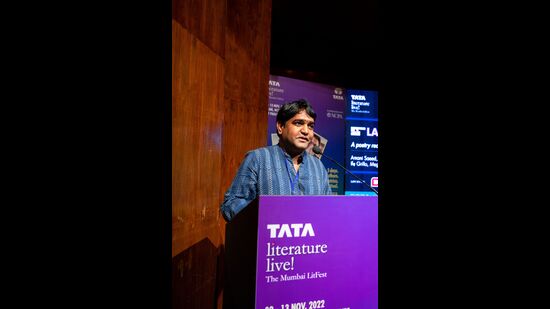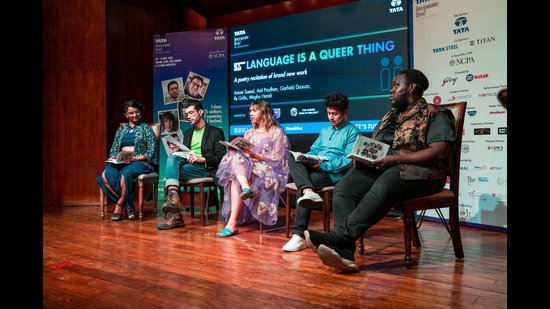Interview: Rafiul Alom Rahman, Founder & Director, The Queer Muslim Project
On focussing on culture change, and about the anthology Language is A Queer Thing which brings forth the richness and diversity of queer
When you embrace queerness as an identity or a label, what does it mean to you?

I think of “queer” as an expansive category that holds together what is different from the norm. These differences exist not only along the lines of sexual orientation and gender expression but also in terms of the languages we speak and the cultures we inhabit. Differences can be threatening but they can also be beautiful. They don’t have to stop us from working together. We can create art despite our differences; it is a tool for social change.
Tell us the story behind Language is A Queer Thing. How did you get involved in this?
In a country like India, which is so diverse, people understand queerness in a variety of ways. Yet, we often fall back on language that is preferred by urban, English-speaking people. Using this reality as a starting point, we at The Queer Muslim Project (TQMP) have been involved in thinking about what queerness means to people beyond what is easily recognizable and understood. In the UK too, there is no homogenous way of experiencing and articulating queerness. People from marginalized backgrounds have stories that are different from the dominant mainstream.
Language is A Queer Thing was born of a need to explore this and create something meaningful. The idea was to facilitate an India-UK writing exchange between three India-based (Megha Harish from Bangalore, Anil Pradhan from Kolkata, and Garfield D’souza from Mumbai) and three UK-based queer poets (Amani Saeed from London, Ife Grillo from Bristol, and Sanah Ahsan from London). The project was created and organized by the VERVE Poetry Festival in Birmingham in partnership with TQMP in Delhi. It was funded by the British Council as part of its India: UK Cultural Exchange Season.
How were the six poets in this project selected? What criteria did they have to fulfill?
We announced open calls for the selection process in India and the UK but there was a small window of time within which people had to apply. This was a constraint because of our timelines. While going through the applications, we noticed that many of the UK applicants had some experience in performing poetry whereas the Indian applicants were excellent writers but quite new to the scene of performing their poetry on stage. We were looking for people with a strong narrative voice, who had the potential to benefit from some training and become excellent performers even if they did not have prior experience as performers.
When you created three pairs out of this group of six, were you relying purely on instinct or did you have certain considerations that informed your curation?
This is an interesting question. Let me try to answer it. Amani from the UK and Megha from India were invited to perform at the opening of the British Council’s India: UK Cultural Exchange Season in Delhi. When we saw them write, create, and perform together, the chemistry was excellent. Pairing them with each other was the most obvious thing to do.
With the other two pairs, the process was not the same. Anil from India was paired with Ife from the UK. While both write about home and belonging, their styles are different. Ife has a strong and confident stage persona. Anil’s work is powerful but his style is subtler. It has been fascinating to watch the trajectory both have been through, coming out of their initial discomfort about why they had been paired with someone so different from them. They are now able to appreciate how they have informed each other’s writing and performance styles.
Garfield was paired with Sana. He has this ability to lift the audience out of their sadness with his sense of humour. Sana can just captivate the audience. She is powerful. I had seen her performances online before I met her. Garfield and Sana are different from each other in their content and delivery but eventually, it did not matter. They were able to work together.
What was the process that they had to go through as part of the project?
The six poets participated in online sessions with each other and participated in two residencies after that. One of these was in Birmingham, leading into the BBC Contains Strong Language Festival 2022. The other residency took place in Mumbai, leading into the Tata Literature Live! 2022. They also created an anthology called Language is A Queer Thing, named after the project. As queer people, we are often reduced to stereotypes and caricatures instead of being treated as individuals. This anthology brings forth the richness and diversity of queer experiences, the significance of celebrating queer joy, and the need for a safe space to talk about fears and vulnerabilities. It affirms the beauty of not fitting in.

The poets not only come from different geographical and cultural backgrounds but also from different styles of performing poetry, and different kinds of literary influences. They got to be in conversation with each other, learn new things, and write pieces together. They were mentored by people from the fields of poetry, theatre, and storytelling in Birmingham (Jasmine Gardosi) and Mumbai (Vikram Phukan, Yuki Ellias, Harkat Studios). The bonding that happened online helped when they met in person. They walked the streets, soaked in popular culture, and got exposure to the queer histories and queer geographies of these cities. Unfortunately, Sana was not able to join the Mumbai residency because of some visa issues.
It was delightful to watch them take leadership, hold each other, and bloom. While the Birmingham residency was more about technical aspects of writing and performance, the Mumbai residency helped them think about the broader vision behind their work as queer creators. In Mumbai, Megha and Ife decided to pair up and create a new poem. Mumbai was warm and vibrant. The sea, cinema, the workshops on characterization and filmmaking… it was all very stimulating. We were in Colaba, so there was a lot of heritage and art to take in.
An anthology seems ideal as a form that is open to multiple, diverse, and even conflicting voices as there is no single creator. Also, a lot of queer literature produced by queer collectives rather than publishers is available in the form of anthologies…
Absolutely! I think that you have captured the spirit of what we are trying to do here. As a queer Muslim man who comes from a Bengali-speaking community in northeast India, I find that my own context of being queer is so different from the queer friends I have in Delhi, Mumbai, Chennai, and Bangalore. This extraordinary range of experiences is missing from popular culture because we don’t get to tell our stories. Usually, someone else is telling them. We may not have the resources to tell our own stories even if we have the skills to tell them. Queer curators and arts managers must ensure that diversity is respected and showcased.
How does Language is A Queer Thing fit within your broader vision for TQMP?
I am glad you are asking me this question. I founded The Queer Muslim Project in 2017. The idea was to have queer Muslims tell their own stories instead of being reduced to characters in the imaginations of others. A lot of our work is about visibility and representation not only for queer Muslims but also for queer people who come from other marginalized communities. If given the right kind of support, and a safe nurturing space, they will own and lead it. Nobody should tell their stories on their behalf. They are capable and can move audiences. People who came for the performances in Birmingham and Mumbai were blown away.
None of the three Indians that you have selected are Muslims. How did this happen?
That is true. Of the six poets chosen, only two are Muslim and both are from London. We were looking for a range of voices, not only Muslims because people often say that we work only with Muslims. TQMP is deeply committed to interfaith dialogue and intercultural exchange, so I am glad that we got to lead a project that also gave a platform to other marginalized identities – such as bisexual, Nepali and Christian – in queer communities.
Is TQMP currently leading any interventions to counter Islamophobia in queer spaces?
By virtue of our very existence, we challenge ideas about what Muslims are like and what queer people are like. A major part of our work focuses on culture change and narrative change. We are building the capacity of queer storytellers to make a difference in the world and to create a more inclusive society by speaking their own truth confidently and creatively.
You have also announced a 10-week creative writing programme called The Queer Writers’ Room for young LGBTQIA+ writers from all over South Asia. Tell us more.
We are quite excited about creating a pipeline of queer writers, performers, and artists. This programme is part of that dream. This is targeted at the 18-25 age group. We want them to take up space, hone and share their talents, find opportunities, and be there for each other.
Chintan Girish Modi is an independent writer, journalist and book reviewer.
All Access.
One Subscription.
Get 360° coverage—from daily headlines
to 100 year archives.



HT App & Website






